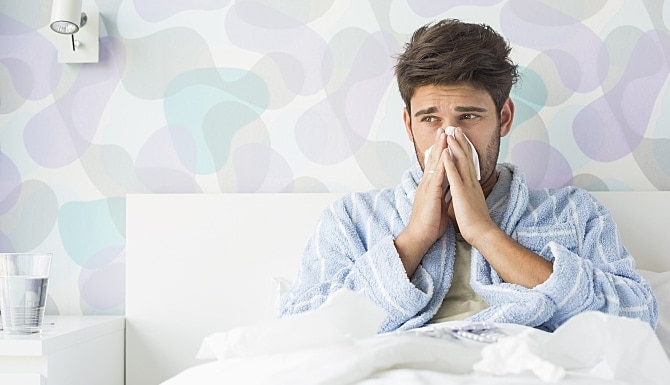The function of sweat is familiar to everyone: it keeps you cool in the heat or during physical activity. Some people are also too familiar with the sweat that comes with public speaking events or a social situation outside of their comfort zone. And then, sometimes you may find yourself sweating in some pretty odd situations, like cold sweats.
What Is Cold Sweat?
There are many physiological situations that could cause you to sweat outside of controlling body temperature. Specific terminology for this type of sweaty varies, although its use often describes what the National Institutes of Health would call "clammy skin." Simply put, any time you're sweating for a reason other than trying to cool yourself, most would describe it as cold sweats; you're sweating at a time when you're not specifically trying to lower your skin temperature. What causes them is a broad question but read on to learn the most common reasons and what you can do to help keep them at bay.
What Are the Causes?
Here are some of the common causes:
- Stress. Stressful situations or high levels of anxiety and nervousness can cause you to sweat.
- Illness. You may sweat when a fever breaks to bring your body temperature back down to normal levels. (This is one exception to the definition above as you are trying to bring your core temperature back down after your body has turned up the heat in an attempt to cook off an invading virus.)
- Pain. If you have ever been in severe pain from injuries, like broken bones or severe lacerations, you may have noticed that you were sweating like crazy ... or you didn't notice until later because the pain was that bad.
- Shock. Your body responds to injuries in a variety of ways, many of which reduce oxygenated blood flow to parts of the body. This is called shock, and cold clammy skin is one of the signs to look out for. Shock must be treated as a medical emergency.
- Motion sickness. Cold sweat is a symptom of motion sickness, says the National Health Service.
- Chronic medical conditions. Unexplained sweating may be a sign of a variety of medical conditions, like coronary heart disease, according to the Cleveland Clinic.
All the above conditions can be accompanied by cold sweats. In many cases, the actual cause is stimulation of the sweat glands from the sympathetic, or fight-or-flight, nervous system that is more active in response to stress, injuries, exhaustion or illness.
How Do You Manage Cold Sweats?
Cold sweats can be caused by many things, and taking care of them depends on what caused them in the first place. In cases related to acute medical conditions and illnesses, you should seek a doctor to treat those conditions before worrying about your sweat. If it's a case of stress or nerves, anything you can do to reach a state of calm will be helpful. For example, sign up for yoga classes, rehearse your presentation until you have it down pat, and review some topics (other than the weather!) to chat about on your next date. In addition to all that, choosing a strong antiperspirant will help keep you dry, fresh and ready to tackle whatever life throws your way.
This article was brought to you by Colgate-Palmolive Company, the makers of Speed Stick products. The views and opinions expressed by the author do not reflect the position of the Colgate-Palmolive Company.

